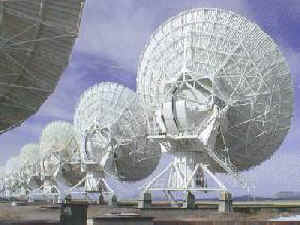Back to the Imaginary Future: Comments on Carl Sagan’s CONTACT (with ETs)

So the Big Think’s AGE OF ENGAGEMENT is advertising a showing of Carl Sagan’s hugely influential film CONTACT. The film will be shown, appropriately enough, as an excellent example of how popularizing scientists influence the portrayal of “aliens” (or ETs) in film.
I’m using this program as an excuse to share with you a revised version of what I wrote about Sagan and the film more than a decade ago. Yes, I know, it’s the third straight post on TV or movies. But Herman Cain (is his name) will be next, who might end up surprising us all.
From the perspective of serious scientists, the most credible recent film presentation of extraterrestrial life is Contact, based on the novel of the same name by physicist Carl Sagan. Sagan, of course, was the most famous and successful popularizing scientist of our time. His book Cosmos sold more copies in America than any other scientific book, and the television series based on it was equally successful. He appeared as an expert on all of the important television shows and wrote a regular column for Parade. He was an articulate and often penetrating defender of the dominant scientific view of our species, our planet, and the cosmos, and he made clear in accessible language the moral and political implications of that view.
Much of Sagan’s writing is unabashed scientific propaganda in support of the search for extraterrestrial intelligence. The possibility of intelligent extraterrestrial life especially animated his curiosity. He was distressed by the American government’s lack of interest in pursuing such fundamental knowledge, observing that “every civilization in human history has devoted some of its resources to investigating deep questions about the Universe, and it is hard to think of a deeper one than whether we are alone.”
To mobilize public opinion on behalf of this research Sagan talked up the likely technological and moral benefits of contact with beings more advanced than we are: Their wisdom might well save us, he argued, and it is most unlikely that they would use their weapons to destroy us.
The film Contact, written by Sagan and his wife, appeals (more than the book does) to the religious dimension of the search for extraterrestrial intelligence. It presents the comforting picture of advanced beings watching over us and gradually and benevolently intervening in our affairs. Through this contact, otherwise unknowable secrets about the nature of the cosmos are revealed to a human being. The revelation somehow brings inspiration to a world searching for meaning to replace discredited biblical religion.
But Sagan uses the image of the biblical God to promote his scientific view that whatever extraterrestrial intelligence we might contact would have “uncompromisingly benign” intentions. He assumes that our planet is technically the most backward in the galaxy; one more backward still would have no radio astronomy and so no way of contacting others. Our fears about extraterrestrial contact, he says, are simply evidence of our own “guilty conscience” about human history. They make no sense in terms of understanding a society more advanced than ours.
As further evidence that we have nothing to fear from extraterrestrial civilizations, Sagan observes: “The vast distances that separate the stars are providential. Beings and worlds are quarantined from one another. The quarantine is lifted only for those with sufficient self-knowledge and judgment to have traveled from star to star.” Yet he also warns repeatedly that there is no scientific evidence for natural or divine providence or for the existence of extraterrestrial civilizations; any appeal to providence is “a failure of nerve” before the truth about the “indifference” of the universe.
But both technology and morality, Sagan says, clearly evolve. Human conflict and injustice are rooted in “the deep, ancient reptilian part of the brain”; human history is the movement away from reptilian behavior and toward living scientifically and cooperatively, from pure body to pure mind. With time, all forms of intelligent life become less passionate and violent, or more benignly godlike. The only glitch in the process is that moral evolution sometimes lags behind technological development, as is the case now on Earth, raising the prospect of technological self-destruction. Extraterrestrials, he says, may aid us in moral evolution, saving us from ourselves.
There is nothing self-evident about this conclusion, however. Human technology and morality are rooted in specific features of our human nature and our earthly environment. We have trouble living well with the fact of death, in part because our bodies are frail and vulnerable but also because we are conscious of our bodily limitations. We experience ourselves as individuals. Our personal morality is rooted in the facts that we reproduce sexually and that our young take a long time to become independent. And our passions are a complex mixture of self-consciousness, sociality, and bodily impulse–of death, love, and sex. It is far from clear that extraterrestrials would share many of our experiences or could tell us much about how to live well with them.
Perhaps they could show us technological means to overcome some of the present limitations of being human. Although neither they nor we could become immortal-no life or even the cosmos itself will exist in its present form forever—we might learn how to postpone death indefinitely and make accidental death less likely.
But would that be moral progress? Would we be happier as a result? So far, the increase in human security through technology has not freed human beings from fear. Instead, human life has become more fearful; as death comes to seem less necessary and more accidental, individuals have more to lose. In any case, we usually identify spiritual progress with living well with death, not overcoming it through science.
Given the connection between love and death in human experience, wouldn’t pushing back death lead to a reduction in love? Would our alien teachers understand how fundamental and precious love is for human beings? Love is a compensation, and for many, at least, a more than adequate compensation, for death.
Sagan does not confront these questions in Contact. His advanced extraterrestrials are loving beings, and they make their human visitor aware of how little she has loved, or made genuine contact with, her fellow human beings. There is even the suggestion that all intelligent beings experience cosmic loneliness or alienation, and so all need each other. But it is unclear how the extraterrestrials live with their mortality, and their love seems disembodied. They are too angelic, or passionless, to be seen as flawed mortals. They are unrealistically benign and so quite boring.





